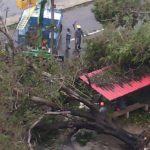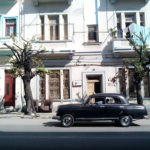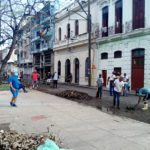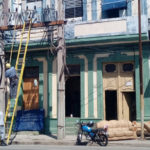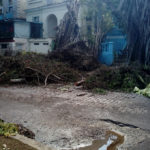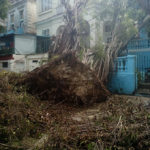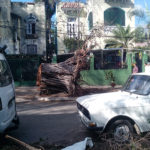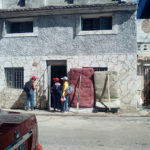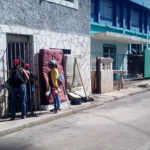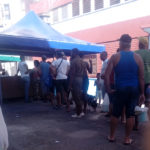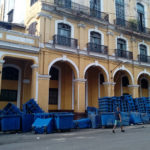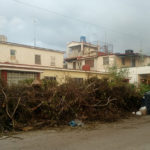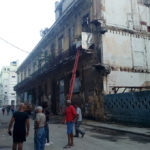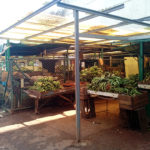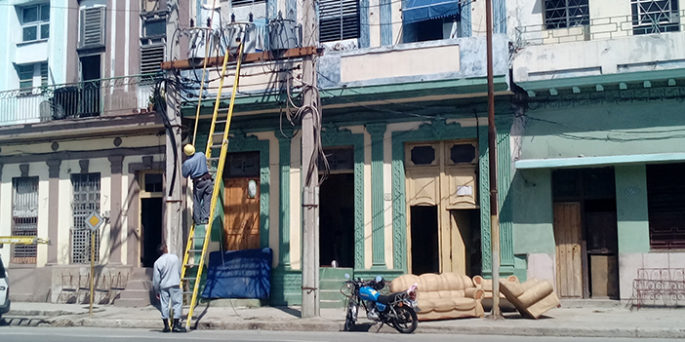
A damage report (and what we’re doing about it)
HAVANA — In Buenavista (municipality of Playa) and in Canal (Cerro), the first thing that some people do when the electricity comes back is to connect the refrigerator. Next, they turn the radio on — loudly. It’s their way to straighten out the day, to return to normal life.
The laurel trees on Prado Boulevard look like a still-life painting: they’re upright but totally dead. From a rickety balcony near Neptuno Street come the loud sounds of a reggaeton; people dance, their arms waving.
In Central Park, where half the trees are down, sports fans gather to talk; the “regulars” bring along rum.
The spirit of resistance finds peculiar expressions.
“Listen, I’m upbeat, really,” says Lidia, sitting on the street next to her refrigerator, which is drying in the sun. Nearby, some cushions, still wet, have been laid out to dry.
Lidia went through Hurricane Irma at the home of her grandson, two blocks away.
“When I returned home and walked in, I didn’t know whether to cry or stay cool. Sadness hit me in the heart.”
Lidia says that the representatives of the People’s Power and the Party have gone through the neighborhood, talking to people, bringing encouragement. Trucks with drinking water stop by frequently and the locals have received food, “rice and pork, bread, cheese and some bottles of soda … to cope with the moment.”
Neighbors in the block have tried to help each other and share more than their sorrow. “Yesterday, I made a stew; one woman brought rice, another brought some hot dogs and potatoes.” A woman greets Lidia and suggests that after washing the inside of the refrigerator she dry it with a hair dryer, as she herself did.
Two nights earlier (Sept. 13), the power came back for one hour, but Lidia didn’t turn on any appliance. The hospital’s Radiology Department, across the street from her home, has power and allows her to recharge her cell phone. “Hey, comrade, you owe me 50 pesos,” an employee jokes. “Thank you, love,” she answers, “I’ll pay you when I find my purse, which I lost in the flood.” Both laugh.
A woman comes to inquire how she is. “Oh, Toñita, what happened to us was major.” Toñita is carrying a basket, looking for food. She went to the store at Infanta and San Lázaro, but it is closed because of sewage problems. “If you want to store something, I have electricity,” she tells Lidia. “If you need anything, just call me.”
A few moments ago, Lidia spoke on the phone to her sister, who lives in Miami and has no electricity. Both sides of the Strait withstood the same storm; the commiseration was mutual. “The problem is that half of Havana has moved to Florida,” she says.
To Lidia, the priorities are clear. “We’re alive, love. The material things we’ll recover little by little.” But as she turns the corner of Oquendo and San Lázaro, optimism fades. A water line on the buildings shows that the flooding rose above 3 feet.
—–
Shoes, pillows, mattresses. The inside of homes can be found on the street, drying under the sun. Tatiana doesn’t plan to cook today because she no longer has a fireplace. The lock in her door is missing, but she’s not worried about security. All the valuables she had were swept away by the sea.
First things first. Cleaning liquids and canned food are sold under two makeshift tents. Nobody’s buying mango marmalade, says the vendor, but customers can buy only two tins of sardines per person, to prevent hoarding.
–“How late will you be open?”
–“I don’t know, sweetie, until they tell us. Yesterday, we stayed open until 8 p.m.”
Yesterday, the outdoor store sold water biscuits and the customers became a little rowdy, so police were called. “If the people bought the food to eat, okay; but later you see the people reselling it,” says Lidia, disapprovingly.
Lidia did not approve of the fact that police took away a man selling food out of a pushcart. “If the government doesn’t have the food, let the man do his thing. He even takes it to your house. So, where did he get it? God only knows. Wherever. But he’s helping the people just the same.”
—–
At a corner, a sanitation man in the anti-vectorial campaign (popularly called “the mosquitoes”) gives instructions to a group of women doctors. An Army officer also talks to them.
The doctors go door to door, informing residents about the prevention of diarrhea diseases. They distribute rat poison and water purification products. “Not everybody welcomes you, true, but they understand the situation,” says Adnisel, a doctor from Guantánamo. Naile, from the same province, says that they performed their task in the Diez de Octubre municipality.
Both women are staying in Casablanca, across the bay, temporary home for about 300 doctors from all over Cuba. They will return to their homes on Oct. 2, when another team will replace them.
The Wi-Fi at Trillo Park is working and many people are taking advantage of it. A brigade of convicts is picking up the debris. Juan Carlos says that, once they’re finished, they’ll be sent to Zanja Street. He doesn’t know when their workday will end.
In fact, many people have been complaining about the garbage pickup in several municipalities. Part of the accumulation of garbage is caused by people who just drop their bags outside the empty Dumpsters.
Community services are “iffy” in the best of times; now they’re simply overwhelmed and that’s understandable. Recovery is a question of hurrying up, then waiting.
Pupy, a produce vendor at San Rafael and Hospital streets, says that “the two days after the storm, we were open until 8 p.m.; later, until 6.” None of the food spoiled. He says they sold malanga, potatoes and sweet potatoes.
–“But all I see here is plantains,” I observe.
–“That’s all that’s left. Yesterday, I put out that bag of yucca, and see how little is left.”
Nearby, a vendor pedals his bicycle carrying gladioli and other flowers. Some children do calisthenics on the street. “Hurricanes that are named after women are the worst,” complains a local. We all laugh.
“Good God, how long is this going to last,” asks a woman made desperate by the lack of electricity. Someone tried to console her: “If the light doesn’t come back, we’ll build a bonfire.”
We are saved by our obstinate habit of making lemonade when life gives us only lemons.
ALL PHOTOS by the author Eileen Sosin Martínez.


